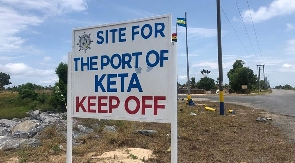The Keta Port project in Ghana envisioned as transformative infrastructure development, has been a topic of national discussion for almost 8 years. The project, aimed at boosting the local economy and enhancing maritime trade, has been likened to a mirage, constantly out of reach, with feasibility studies and promises being the only tangible outcomes to date.
The concept of a port in Keta has been part of Ghana's developmental discourse for decades. The region's strategic location and potential for economic growth have made it an ideal candidate for a port development. However, the project has seen little progress beyond the planning stage, including the proposed landing ports in Keta for our fishermen, which the information ministered publicly declared that the USD$235 million has be secured for these landing port projects. Where is Keta’s landing port allocation?
According to Hon. Kojo Oppong Nkrumah, November 28, 2018, “top on the agenda for fisheries will be the program of building landing sites and storage facilities in Teshie in the Greater Accra Region, Axim and Dixcove in the Western Region, Keta in the Volta Region and Elmina, Winneba, Mumford, Senya-Bereku, Fetteh-Gomah, and Moree, all in the Central Region”.
“the development of the fish landing sites and ports is aimed at ensuring safeguard launching and landing of particularly, artisanal fishing and canoes”.
“It is also aimed at creating and maintaining a hygienic environment for the processing and handling of fish. Preventing and minimising post-harvest losses and adding value to the fish caught by artisanal fishermen,” https://www.peacefmonline.com/pages/business/industry/201811/369023.php
Feasibility Studies: A Never-Ending Story
The primary step in any major infrastructure project is a feasibility study. For the Keta Port, numerous studies have been conducted to assess the viability, economic impact, and environmental considerations. Yet, these studies seem to have become an end rather than a means to an end. The continuous cycle of assessments without any substantial movement towards actual construction has led to skepticism among the populace.
Comparisons with Other Landing Port Projects
The situation with the Keta Port is a unique one. Most of the other landing port projects across the country have followed been commissioned but not a single block has been laid for Keta landing site, to say the least. This pattern raises questions about the commitment and capacity to bring these projects to fruition.
Economic Implications
The stagnation of the Keta Port project has broader economic implications. A functional port in Keta could significantly boost trade, create jobs, and contribute to regional development. The delay thus represents not just a missed infrastructure opportunity but a significant economic loss.
Government's Role and Public Perception
The government's role in repeatedly commissioning studies without follow-up action has affected public trust. The perception that these projects are mere political tools rather than genuine developmental efforts is growing. For a project like the Keta Port to gain credibility, a clear roadmap with committed timelines and transparent processes is essential.
The Keta Port project, as it stands, symbolizes unfulfilled potential. While feasibility studies are crucial, they must be steps towards actualization, not perpetual placeholders. For Ghana to reap the benefits of such infrastructural projects, a shift from perpetual planning to decisive action is imperative. The Keta Port, if realized, could be a catalyst for regional transformation, but for now, it remains a mirage of unfulfilled promises.
Opinions of Monday, 5 February 2024
Columnist: Enyonam Adzo Gemegah



















